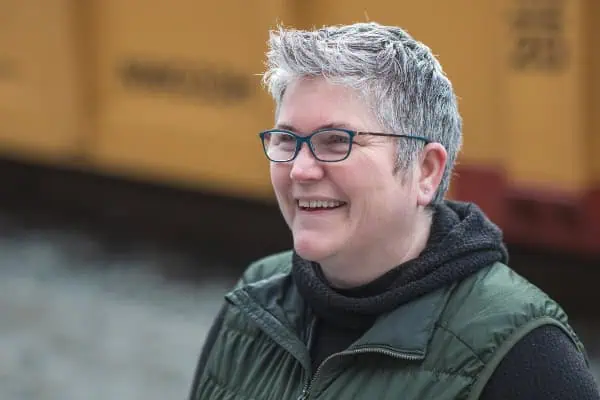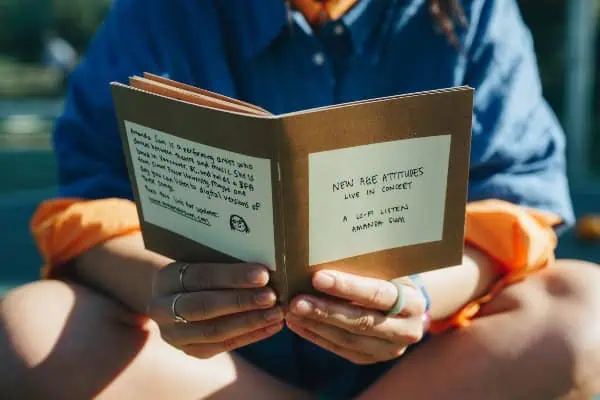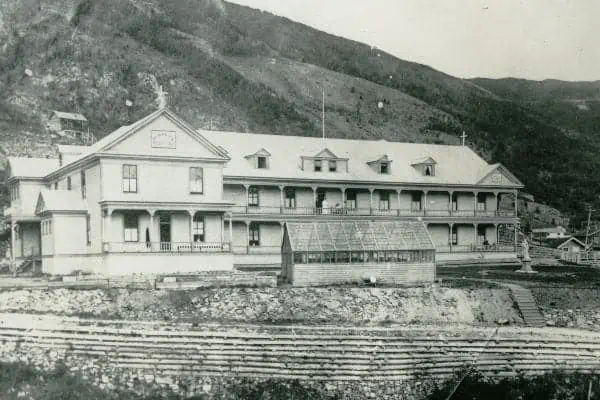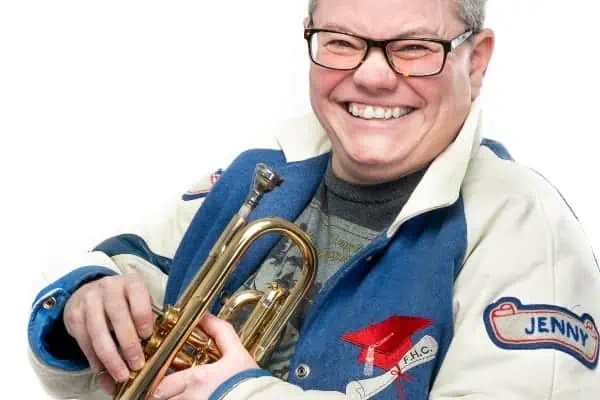On the day before the 13th Annual Dawson City International Short Film Festival (DCISFF) schedule was released, I joined festival producer, Dan Sokolowski, in his office in the Klondike Institute of Arts and Culture (KIAC).
A giant whiteboard with 110 colour-coordinated cards taped to it faced Sokolowski’s desk. Each card was printed with a name of a film and arranged within a grid of the days of the festival.
It looked like a massive puzzle, but using this visual map is how Sokolowski gets organized for four days of films, lectures, workshops, feasting and karaoke.
“So happy to be finished!” Sokolowski grins, moments from sending the festival program for proofreading.
Toronto Genie Award-winning director Peter Lynch will open the festival, in addition to discussing his new drama-documentary, Paahtomahsikimii—The Lakes Which Go Into The Mountain IMAGES: Provided by the Dawson City International Short Film Festival
This is Sokolowski’s sixth year as producer, and he says the film selection is the festival’s best yet.
“The more people that come up and the more experience that Yukoners get, I think the selection that we get—we are getting more and more selections every year— obviously the bar moves higher with the films that do get selected,” says Sokolowski.
The festival opens with The Herd (1999), directed by Peter Lynch, from Toronto, who will be in attendance and leading a workshop the following afternoon.
The only feature-length film of the festival, clocking in at 100 minutes, this drama-documentary follows the six-year journey of a 62-year old man driving 3,000 reindeer from Alaska to the Northwest Territories.
In his workshop, Lynch (winner of a Genie Award in 1994, and director of Project Grizzly in 1996) will deconstruct story-telling approaches of his new short film, Paahtomahsikimii —The Lakes Which Go Into the Mountain, which is part of the National Parks Project and will screen during the festival.
Festival themes will reflect Yukon-made films, emerging artists and First Nation stories.
New this year is a selection of short films from Quebec. In a collaboration with Les Rendez-vous ducinéma québecois, 12 shorts will be thrown into the mix, and award-nominated filmmakers GuyÉdoin and Matthew Rankin will be in attendance for their screenings and to lead workshops.
Returning to the festival, and an international highlight for Sokolowski, is selections from the Rural Routes Film Festival in New York City.
Since October, about 350 submissions have screened to an open selection committee of about 50 locals on Sokolowski’s email list, along with artist/writers in residence and visitors passing through Dawson.
Sokolowski says there was a 10 percent increase in submissions this year. He contributes this, in part, to accessibility for filmmakers to get in the field.
“The cameras are becoming cheaper, more people are editing on their own software systems… In the old days, whether it was film or video, you had to rent an editing system somewhere,”Sokolowski says, suggesting owning gear of your own was a steep several-thousand dollar investment.
“Working in film, if you were not in a city with access to a lab, it was very difficult. Most people now are shooting with their own cameras, editing on their laptops—it’s getting a lot easier.”
The festival will showcase films from Iran, (Falling, an explorative experimental directed by KarimAzimi), Egypt (41 Days, a drama about a World Cup match and a 40-day delay in the broadcast by Ahmed Abdelaziz), Japan (The Mechanism of Spring, an expressive animation by Atsushi Wada), Germany (Workers Leaving the Factory, a drama about metal workers by Anna Linke), in addition to films from Spain, the UK, the USA, Poland, Switzerland, Norway, Ireland and across Canada.
The 1 Minute Film Challenge is back for its fourth year in the festival. This year, aspiring filmmakers are shooting with an iPad, available for rental at KIAC.
The deadline for submissions is April 6, and the films will be screened at Diamond Tooth GertiesGambling Hall the following weekend on April 14.
With this type of innovation and international work being showcased, Sokolowski says the festival, as a venue, becomes that more important.
“I think the biggest goal is try to promote, give Yukon filmmakers a venue to do their works intermixed with the context of international and national works,” says Sokolowski, “Because if you are working in a vacuum, it’s kind of hard to evaluate your work.
Workshops, such as one being led by Carol Geddes, a Gemini-nominated Tlingit filmmaker fromTeslin, gives a chance for aspiring filmmakers to interact with the professionals. Geddes will receive work from selected participants in advance and give the individuals one-on-one feedback.
For youth there are educational workshops too, and there will be an afternoon screening of films for youth and made by youth, including the Grade 2 and 4 classes at the Robert Service School, and from the Youth Art Enrichment program.
Sokolowski adds awards are a great incentive to motivating Yukon submissions to the festival, and these visiting filmmakers keep the venue fresh.
Wrapping up the weekend, an outdoor barbecue will be followed by a karaoke session with Weekend Leisure’s Curtis Grahauer, from Vancouver, before the final evening screenings.
The festival takes place April 5 to 8. Weekend passes are $50 for the general public, and individual screenings are $5 to $8.




